A Report on Social Media's Impact on Influencing Social Movements
VerifiedAdded on 2022/08/08
|9
|953
|32
Report
AI Summary
This report examines the significant impact of social media on influencing social movements in today's mobilized world. It begins by introducing the background of social media as a communication network that facilitates social growth and highlights the role of social movements in driving societal change. The research aims to analyze both the positive and negative impacts of social media in promoting these movements, identifying how societal aspects are reflected on these platforms and exploring solutions for improvement. The literature review discusses the role of social media in amplifying social movement themes, citing examples like #BlackLivesMatter and the ALS Ice Bucket Challenge. It also addresses the importance of social interaction in promoting social well-being. The research methodology employs a positivism research philosophy, a descriptive research design, and a deductive approach, utilizing both primary and secondary data while adhering to ethical considerations and data protection. The project timeline is estimated to be nine months.
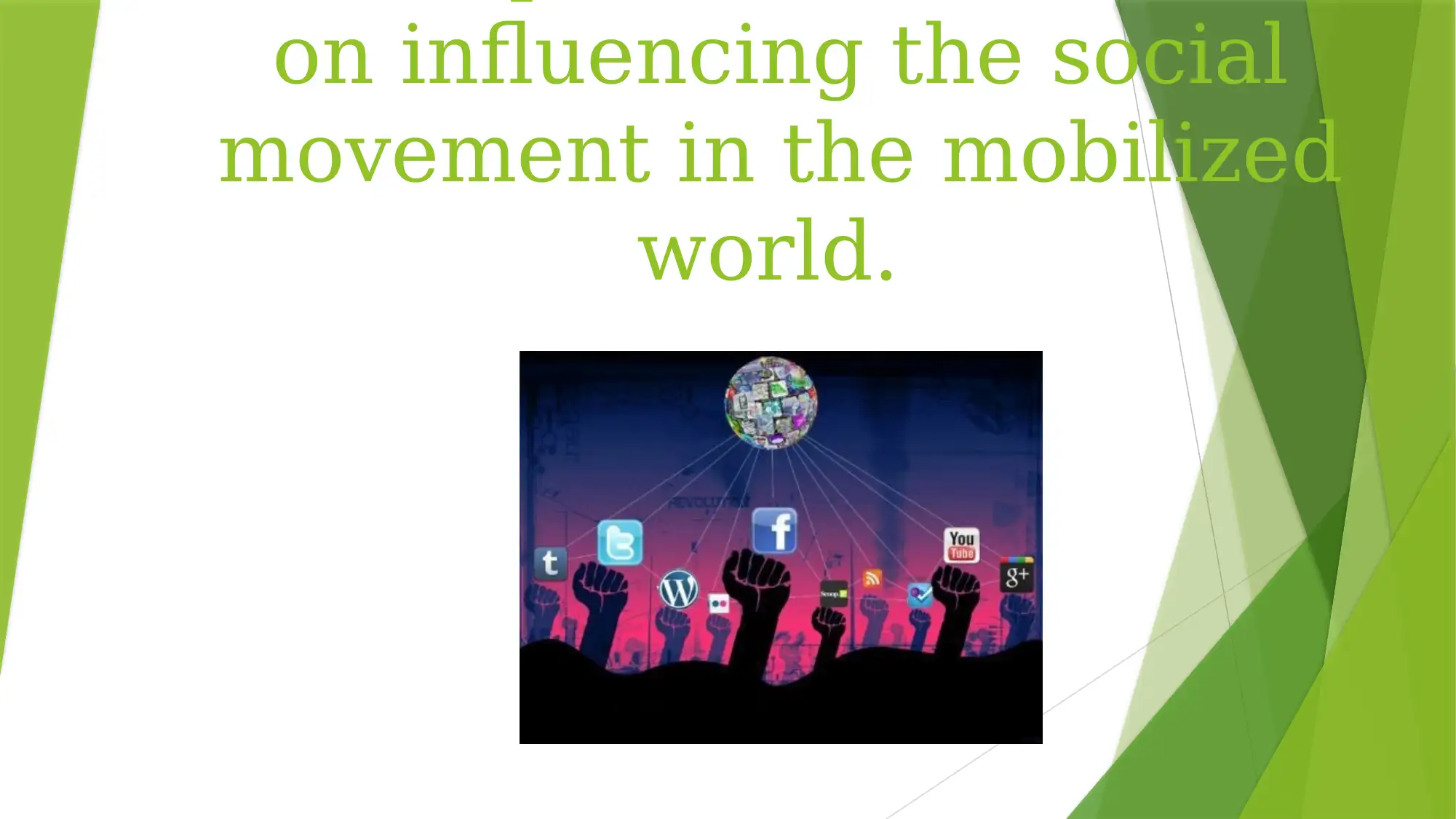
on influencing the social
movement in the mobilized
world.
movement in the mobilized
world.
Paraphrase This Document
Need a fresh take? Get an instant paraphrase of this document with our AI Paraphraser
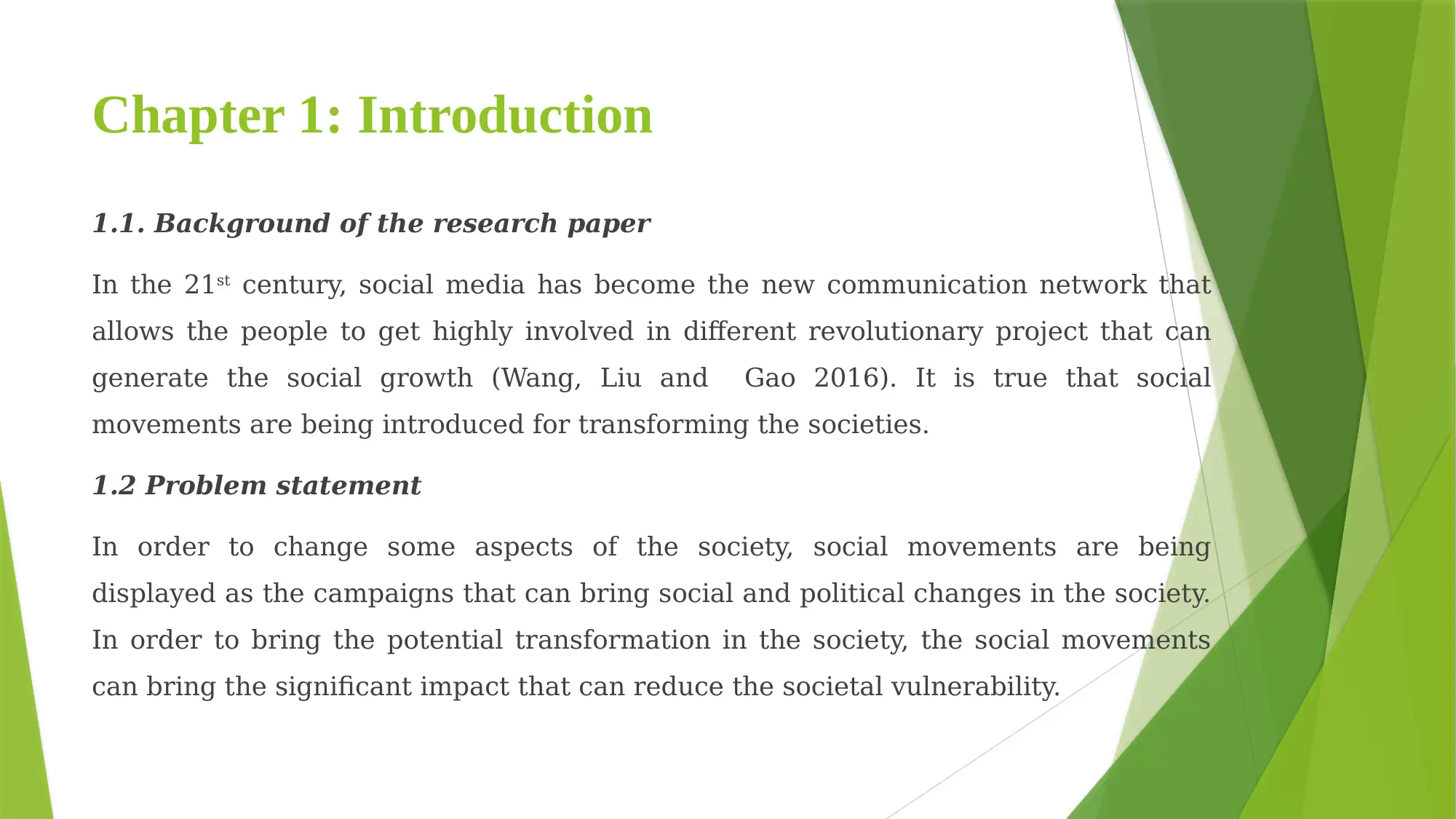
Chapter 1: Introduction
1.1. Background of the research paper
In the 21st century, social media has become the new communication network that
allows the people to get highly involved in different revolutionary project that can
generate the social growth (Wang, Liu and Gao 2016). It is true that social
movements are being introduced for transforming the societies.
1.2 Problem statement
In order to change some aspects of the society, social movements are being
displayed as the campaigns that can bring social and political changes in the society.
In order to bring the potential transformation in the society, the social movements
can bring the significant impact that can reduce the societal vulnerability.
1.1. Background of the research paper
In the 21st century, social media has become the new communication network that
allows the people to get highly involved in different revolutionary project that can
generate the social growth (Wang, Liu and Gao 2016). It is true that social
movements are being introduced for transforming the societies.
1.2 Problem statement
In order to change some aspects of the society, social movements are being
displayed as the campaigns that can bring social and political changes in the society.
In order to bring the potential transformation in the society, the social movements
can bring the significant impact that can reduce the societal vulnerability.
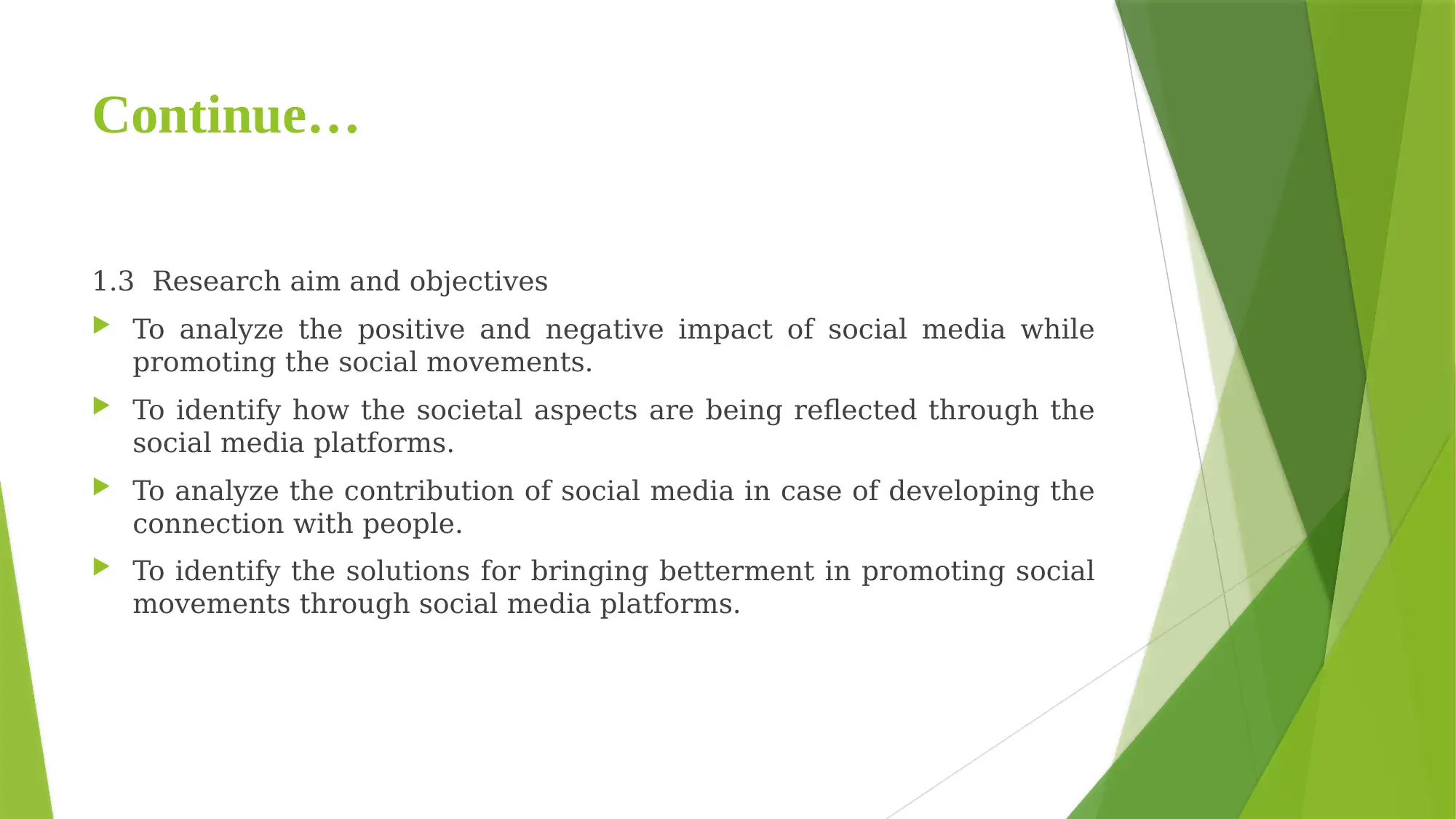
Continue…
1.3 Research aim and objectives
To analyze the positive and negative impact of social media while
promoting the social movements.
To identify how the societal aspects are being reflected through the
social media platforms.
To analyze the contribution of social media in case of developing the
connection with people.
To identify the solutions for bringing betterment in promoting social
movements through social media platforms.
1.3 Research aim and objectives
To analyze the positive and negative impact of social media while
promoting the social movements.
To identify how the societal aspects are being reflected through the
social media platforms.
To analyze the contribution of social media in case of developing the
connection with people.
To identify the solutions for bringing betterment in promoting social
movements through social media platforms.
⊘ This is a preview!⊘
Do you want full access?
Subscribe today to unlock all pages.

Trusted by 1+ million students worldwide
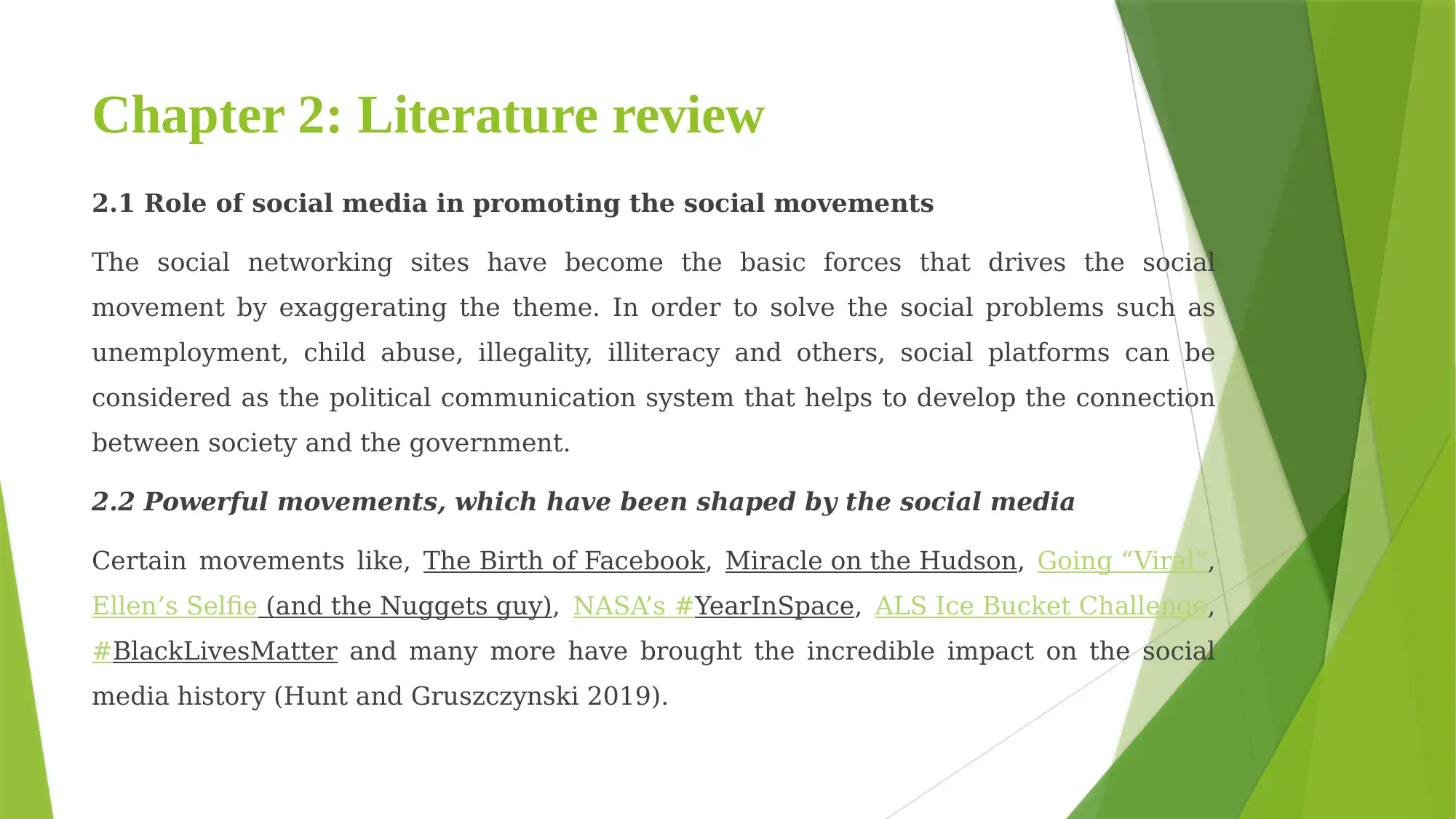
Chapter 2: Literature review
2.1 Role of social media in promoting the social movements
The social networking sites have become the basic forces that drives the social
movement by exaggerating the theme. In order to solve the social problems such as
unemployment, child abuse, illegality, illiteracy and others, social platforms can be
considered as the political communication system that helps to develop the connection
between society and the government.
2.2 Powerful movements, which have been shaped by the social media
Certain movements like, The Birth of Facebook, Miracle on the Hudson, Going “Viral”,
Ellen’s Selfie (and the Nuggets guy), NASA’s #YearInSpace, ALS Ice Bucket Challenge,
#BlackLivesMatter and many more have brought the incredible impact on the social
media history (Hunt and Gruszczynski 2019).
2.1 Role of social media in promoting the social movements
The social networking sites have become the basic forces that drives the social
movement by exaggerating the theme. In order to solve the social problems such as
unemployment, child abuse, illegality, illiteracy and others, social platforms can be
considered as the political communication system that helps to develop the connection
between society and the government.
2.2 Powerful movements, which have been shaped by the social media
Certain movements like, The Birth of Facebook, Miracle on the Hudson, Going “Viral”,
Ellen’s Selfie (and the Nuggets guy), NASA’s #YearInSpace, ALS Ice Bucket Challenge,
#BlackLivesMatter and many more have brought the incredible impact on the social
media history (Hunt and Gruszczynski 2019).
Paraphrase This Document
Need a fresh take? Get an instant paraphrase of this document with our AI Paraphraser
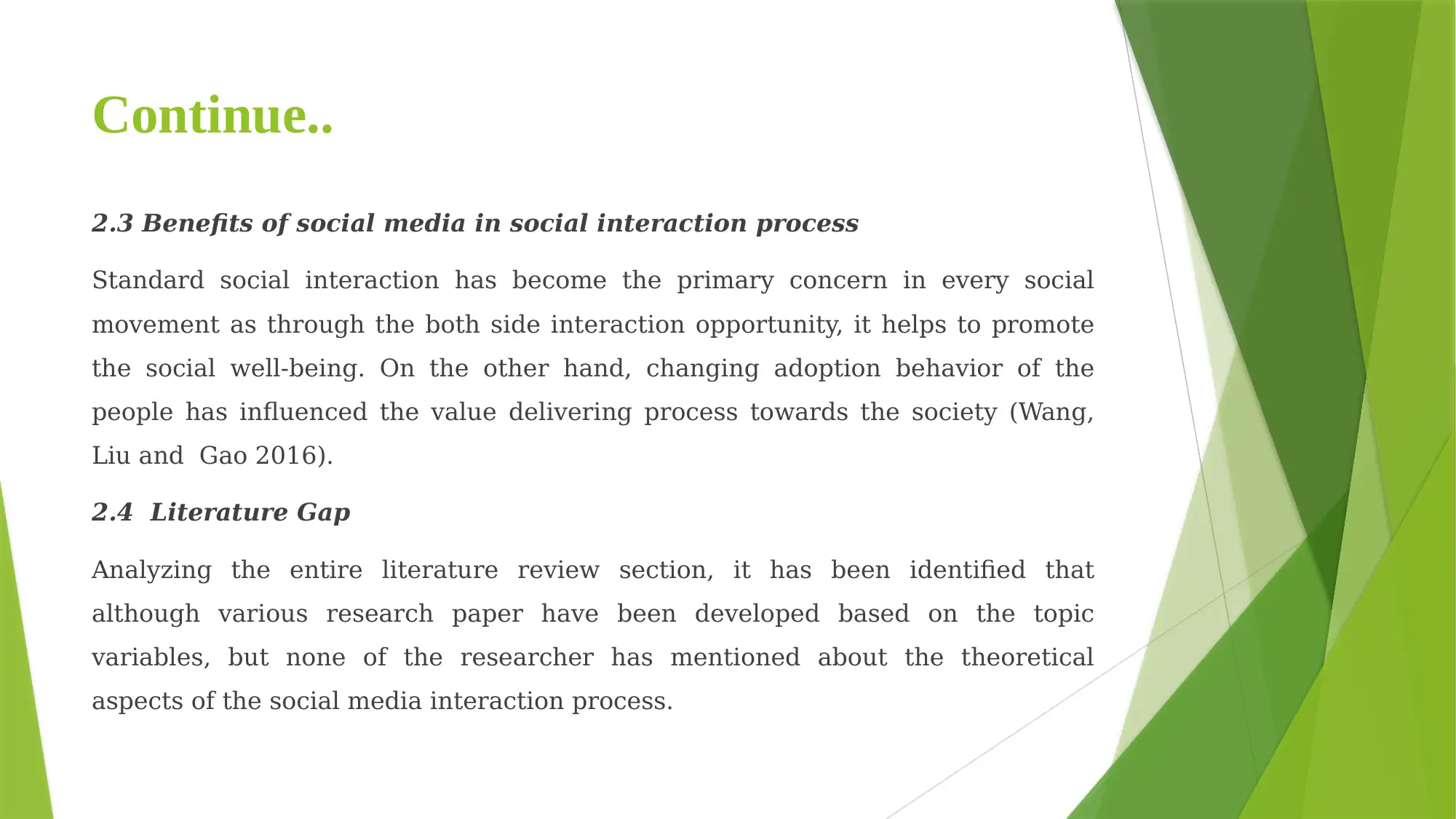
Continue..
2.3 Benefits of social media in social interaction process
Standard social interaction has become the primary concern in every social
movement as through the both side interaction opportunity, it helps to promote
the social well-being. On the other hand, changing adoption behavior of the
people has influenced the value delivering process towards the society (Wang,
Liu and Gao 2016).
2.4 Literature Gap
Analyzing the entire literature review section, it has been identified that
although various research paper have been developed based on the topic
variables, but none of the researcher has mentioned about the theoretical
aspects of the social media interaction process.
2.3 Benefits of social media in social interaction process
Standard social interaction has become the primary concern in every social
movement as through the both side interaction opportunity, it helps to promote
the social well-being. On the other hand, changing adoption behavior of the
people has influenced the value delivering process towards the society (Wang,
Liu and Gao 2016).
2.4 Literature Gap
Analyzing the entire literature review section, it has been identified that
although various research paper have been developed based on the topic
variables, but none of the researcher has mentioned about the theoretical
aspects of the social media interaction process.
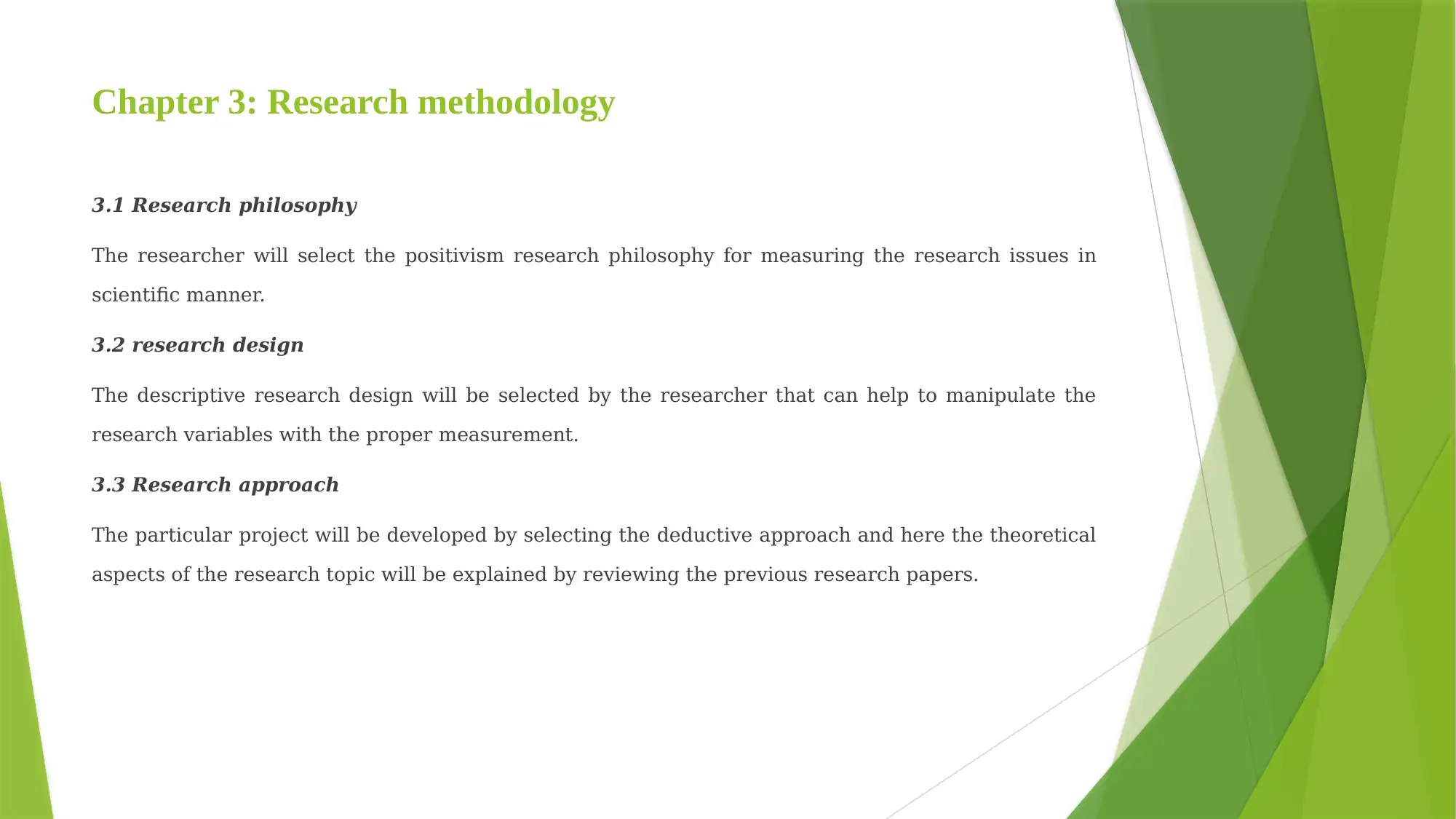
Chapter 3: Research methodology
3.1 Research philosophy
The researcher will select the positivism research philosophy for measuring the research issues in
scientific manner.
3.2 research design
The descriptive research design will be selected by the researcher that can help to manipulate the
research variables with the proper measurement.
3.3 Research approach
The particular project will be developed by selecting the deductive approach and here the theoretical
aspects of the research topic will be explained by reviewing the previous research papers.
3.1 Research philosophy
The researcher will select the positivism research philosophy for measuring the research issues in
scientific manner.
3.2 research design
The descriptive research design will be selected by the researcher that can help to manipulate the
research variables with the proper measurement.
3.3 Research approach
The particular project will be developed by selecting the deductive approach and here the theoretical
aspects of the research topic will be explained by reviewing the previous research papers.
⊘ This is a preview!⊘
Do you want full access?
Subscribe today to unlock all pages.

Trusted by 1+ million students worldwide
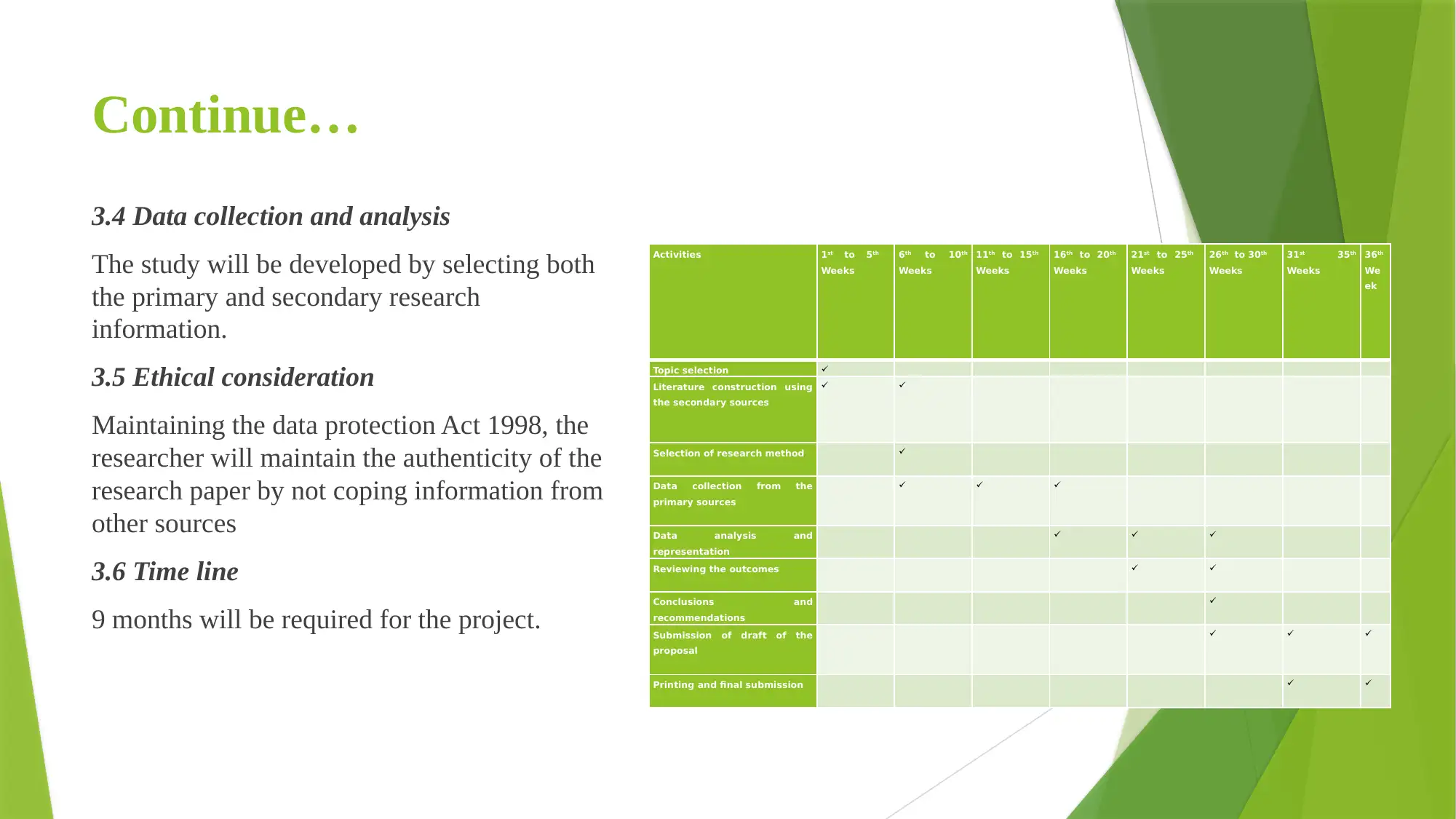
Continue…
3.4 Data collection and analysis
The study will be developed by selecting both
the primary and secondary research
information.
3.5 Ethical consideration
Maintaining the data protection Act 1998, the
researcher will maintain the authenticity of the
research paper by not coping information from
other sources
3.6 Time line
9 months will be required for the project.
Activities 1st to 5th
Weeks
6th to 10th
Weeks
11th to 15th
Weeks
16th to 20th
Weeks
21st to 25th
Weeks
26th to 30th
Weeks
31st 35th
Weeks
36th
We
ek
Topic selection
Literature construction using
the secondary sources
Selection of research method
Data collection from the
primary sources
Data analysis and
representation
Reviewing the outcomes
Conclusions and
recommendations
Submission of draft of the
proposal
Printing and final submission
3.4 Data collection and analysis
The study will be developed by selecting both
the primary and secondary research
information.
3.5 Ethical consideration
Maintaining the data protection Act 1998, the
researcher will maintain the authenticity of the
research paper by not coping information from
other sources
3.6 Time line
9 months will be required for the project.
Activities 1st to 5th
Weeks
6th to 10th
Weeks
11th to 15th
Weeks
16th to 20th
Weeks
21st to 25th
Weeks
26th to 30th
Weeks
31st 35th
Weeks
36th
We
ek
Topic selection
Literature construction using
the secondary sources
Selection of research method
Data collection from the
primary sources
Data analysis and
representation
Reviewing the outcomes
Conclusions and
recommendations
Submission of draft of the
proposal
Printing and final submission
Paraphrase This Document
Need a fresh take? Get an instant paraphrase of this document with our AI Paraphraser
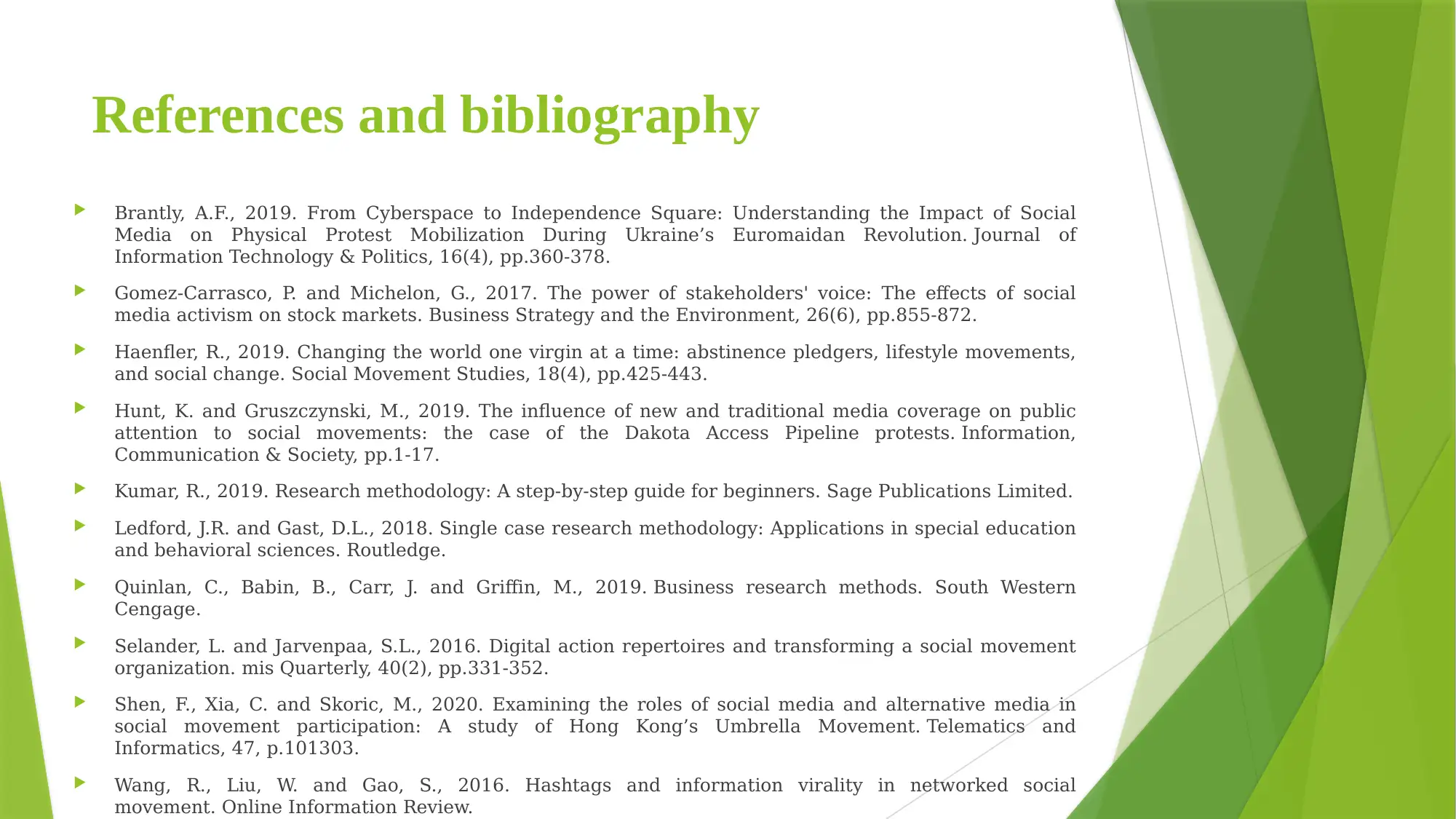
References and bibliography
Brantly, A.F., 2019. From Cyberspace to Independence Square: Understanding the Impact of Social
Media on Physical Protest Mobilization During Ukraine’s Euromaidan Revolution. Journal of
Information Technology & Politics, 16(4), pp.360-378.
Gomez‐Carrasco, P. and Michelon, G., 2017. The power of stakeholders' voice: The effects of social
media activism on stock markets. Business Strategy and the Environment, 26(6), pp.855-872.
Haenfler, R., 2019. Changing the world one virgin at a time: abstinence pledgers, lifestyle movements,
and social change. Social Movement Studies, 18(4), pp.425-443.
Hunt, K. and Gruszczynski, M., 2019. The influence of new and traditional media coverage on public
attention to social movements: the case of the Dakota Access Pipeline protests. Information,
Communication & Society, pp.1-17.
Kumar, R., 2019. Research methodology: A step-by-step guide for beginners. Sage Publications Limited.
Ledford, J.R. and Gast, D.L., 2018. Single case research methodology: Applications in special education
and behavioral sciences. Routledge.
Quinlan, C., Babin, B., Carr, J. and Griffin, M., 2019. Business research methods. South Western
Cengage.
Selander, L. and Jarvenpaa, S.L., 2016. Digital action repertoires and transforming a social movement
organization. mis Quarterly, 40(2), pp.331-352.
Shen, F., Xia, C. and Skoric, M., 2020. Examining the roles of social media and alternative media in
social movement participation: A study of Hong Kong’s Umbrella Movement. Telematics and
Informatics, 47, p.101303.
Wang, R., Liu, W. and Gao, S., 2016. Hashtags and information virality in networked social
movement. Online Information Review.
Brantly, A.F., 2019. From Cyberspace to Independence Square: Understanding the Impact of Social
Media on Physical Protest Mobilization During Ukraine’s Euromaidan Revolution. Journal of
Information Technology & Politics, 16(4), pp.360-378.
Gomez‐Carrasco, P. and Michelon, G., 2017. The power of stakeholders' voice: The effects of social
media activism on stock markets. Business Strategy and the Environment, 26(6), pp.855-872.
Haenfler, R., 2019. Changing the world one virgin at a time: abstinence pledgers, lifestyle movements,
and social change. Social Movement Studies, 18(4), pp.425-443.
Hunt, K. and Gruszczynski, M., 2019. The influence of new and traditional media coverage on public
attention to social movements: the case of the Dakota Access Pipeline protests. Information,
Communication & Society, pp.1-17.
Kumar, R., 2019. Research methodology: A step-by-step guide for beginners. Sage Publications Limited.
Ledford, J.R. and Gast, D.L., 2018. Single case research methodology: Applications in special education
and behavioral sciences. Routledge.
Quinlan, C., Babin, B., Carr, J. and Griffin, M., 2019. Business research methods. South Western
Cengage.
Selander, L. and Jarvenpaa, S.L., 2016. Digital action repertoires and transforming a social movement
organization. mis Quarterly, 40(2), pp.331-352.
Shen, F., Xia, C. and Skoric, M., 2020. Examining the roles of social media and alternative media in
social movement participation: A study of Hong Kong’s Umbrella Movement. Telematics and
Informatics, 47, p.101303.
Wang, R., Liu, W. and Gao, S., 2016. Hashtags and information virality in networked social
movement. Online Information Review.

⊘ This is a preview!⊘
Do you want full access?
Subscribe today to unlock all pages.

Trusted by 1+ million students worldwide
1 out of 9
Related Documents
Your All-in-One AI-Powered Toolkit for Academic Success.
+13062052269
info@desklib.com
Available 24*7 on WhatsApp / Email
![[object Object]](/_next/static/media/star-bottom.7253800d.svg)
Unlock your academic potential
Copyright © 2020–2025 A2Z Services. All Rights Reserved. Developed and managed by ZUCOL.





